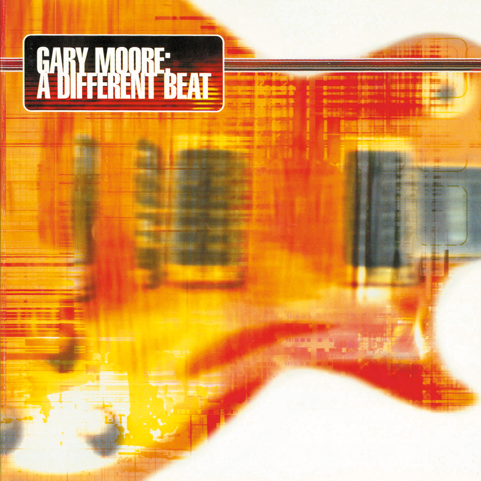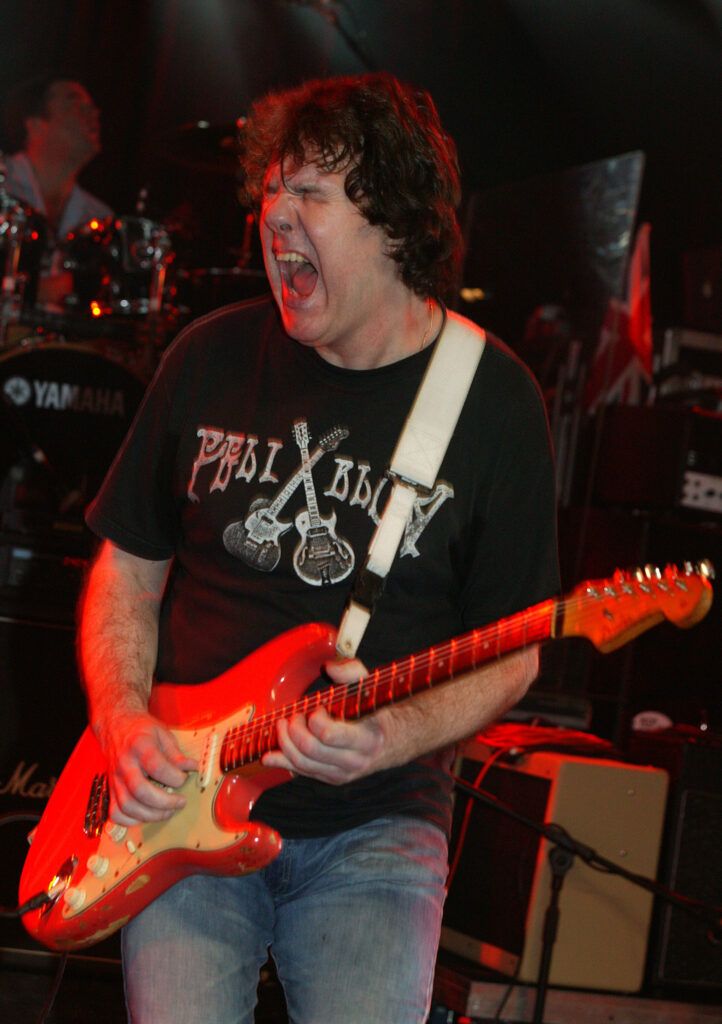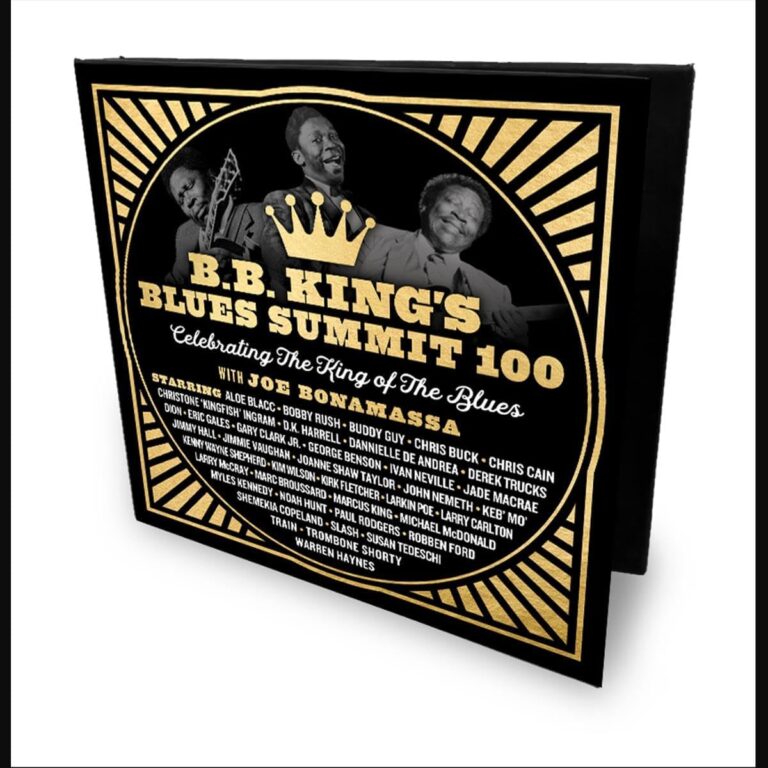
The late 90s was, for many artists, a time of flux. While the beginning of the decade had seen hard rock on the ascent, by the late 90s electronic forms had made ripples well beyond their traditional fanbase. As a result, established artists found themselves dabbling in new forms, with varying degrees of success. David Bowie, ever the chameleon, had taken in industrial, drum and bass and jungle on Earthling (although, by 1999, he had come full circle with Hours), Eric Clapton had incorporated far greater synth elements with Pilgrim, and even the metal god himself, Rob Halford, had collaborated with Trent Reznor on an industrial effort under the guise of Two. Thus, Gary Moore’s controversial A Different Beat is not as surprising as it might appear at first glance.
That said, it wasn’t an easy album for its creator. As the brilliant sleeve notes reveal, there was a sense that he’d taken things a step too far, not least when he played a track for Rob Playford (Goldie’s producer). While it earned a grudging “it’s better than we expected”, even the sleeve notes acknowledge that the record was too rock for the dance crowd and too dance oriented for the rockers – something that is far less of an issue in today’s more open-ended world. Thus, as this rather lovely set demonstrates, while A Different Beat remains an oddity in Gary’s varied canon, it is more than worth a reappraisal, for there is much here to enjoy.
The Package
Reissued by BMG, A Different Beat is appearing on vinyl for the very first time. A double album, it is pressed onto lovely, crackle-free, translucent orange vinyl and it sounds absolutely fantastic, with crystal clear highs and full, throbbing lows. Turn it up and let it wash over you, it’s an album that benefits from being played loud.
With its stylish artwork, it’s a very contemporary looking package, and it features detailed liner notes from well-known journalist Dave Everly, whose lively style puts the album int perspective. Dave, who is clearly enthusiastic about the record, is nonetheless honest about its reception, and his behind-the-scenes stories really help to place the album in context. Beyond this, there’s no booklet, which is a shame, but this is a fine opportunity for fans to give it another listen.

The Album
So, let’s get this out of the way. A Different Beat is not an album for the blues purist and, no matter how glowing a review I write, that’s not going to change. It is, however, a bold record from an artist unwilling to simply make the same record over and over. And “bold” is not too strong a term. Many an artist has come unstuck shifting so radically away from their core sound, and while A Different Beat still uses the language of the blues, the strongly phrased electronic elements are so far removed from the blues lexicon as to be from another world altogether.
Remarkably, however, despite some twenty-three years having elapsed since its release, A Different Beat still sounds amazing. This is absolutely not a bandwagon-jumping effort, thrown out without thought. Gary was always an open-minded artist and, in seeking to make a “drum ‘n’ blues” record, he sought out a capable band that included Roger King (Keyboardist for Steve Hackett), Gary Husband (drums) and Phil Nicholls, while the E-Z Rollers were on hand to offer some production tips along the way. His passion and commitment (admirably brought to life in the sleeve notes) paid off, and A Different Beat has so much power behind its production that it has barely dated. The phrase “ahead of its time” may be overused, but it is apt here, and it’s easy to imagine a generation, utterly unaware of Gary’s work as a blues man, finding this album and clutching it to their collective bosom.
The album kicks into gear with Go On Home, Gary’s heavily wah-inflected guitar giving way to a skittering dance beat worthy of latter-day Depeche Mode. While some of the synth elements now help to locate the track in the late 90s, it’s a blistering opening track, featuring some fiery guitar and a sneering vocal that owes as much to Bobby Gillespie as it does Buddy Guy. Of course, the tether to the blues is still firmly there, only now it’s the blues clad in industrial armour and the results are far more invigorating than anyone might have expected at point of release. It helps, of course, that Gary’s determination to make it work results in a fantastic performance. Take Lost In Your Love, for example, which has a soulful, Dan Reed Network feel and a sparkling solo – it melds the various elements together beautifully, and the playing is exceptional throughout. Then, there’s the shimmering Worry No More, which slips between airy verse and hulking great rock chorus, recalling elements of Clapton’s soundtrack work for the Lethal Weapon series, but with a good deal more fire in its belly. Speaking of Fire, the first side closes with a track of that name, and it is an apt title for a track that perfectly lives up to Gary’s “drum ‘n’ blues” billing.
Having set the scene, Gary takes his foot off the pedal a touch and opens side two with the reflective Surrender, a track that cleaves far closer to the Midnight Blues for which Gary is famed. However, although certain electronic flourishes remain, somewhat ironically, the closer the record sounds to the Gary Moore of old, the less the contemporary armour seems to fit. Nevertheless, it’s a solid track, and one that settles under the skin as it expands into an epic, although it lacks something in comparison to the more energetic numbers found elsewhere. There’s plenty of energy on House Full Of Blues, however, a gritty number complete with scuffed vocal, electrifying guitar work and punchy beat. The second side ends with Bring My Baby Back, a track that opens as a straight, acoustic-blues number, before a taut beat emerges beneath the tune to drag the piece kicking and screaming into the late 20th Century.
Side three mixes things up once again, opening with the toughened drum ‘n’ bass of Can’t Help Myself, which sees Gary crooning over a skittering backdrop, with only a pulsing layer of feedback threatening the eventual arrival of the guitar. A dramatic piece that just keeps on getting heavier, not least when a distorted bass line threatens to overload the speakers, it’s one of the album’s strongest moments and the title seems to reference Gary’s own proclivity for exploring different musical forms, even at the expense of his reputation. In contrast, Fatboy takes things a step too far. A track that sounds exactly like a Fatboy Slim outtake, the guitar is repetitively looped to the point that it may as well simply be a sample lifted from any other record, and while it’s not a bad track (it is, after all, a pretty convincing big beat effort), it’s simply too derivative. Fortunately, We Want Love provides the album with a strong conclusion, Gary side-stepping into trip hop and proving remarkably adept in the process. It rounds out a surprisingly strong set that showcases just how versatile Gary could be and, while his path would lead him back to the blues, you cannot help but feel that moments like this helped to sate his artistic appetite.
Side four officially offers up a single track – an extended E-Z Rollers remix of Can’t Help Myself, which blazes away with real fire. It’s a tasty bonus, and it recalls the 12” remixes so common to the period. Interestingly, there is also an uncredited Surrender at the end. It appears to be the album version and was possibly left there in error, but it caught me by surprise nonetheless.
A Different Beat
Undoubtedly blues purists will scoff, but A Different Beat is the work of a restless artist, who simply couldn’t bear to repeat himself ad nauseam. Given the creative and commercial risks involved, it’s clear that this was no sell out attempt at crossing over, but rather the result of a genuine fascination with different musical forms, and that fascination is evident in each of the album’s ten tracks. Not every track is successful. Fat Boy, in particular, feels more like a piece of fan art than a unique, creative endeavour. However, when Gary’s on it, as he is with tracks like Can’t Help Myself, We Want Love and Fire, the results are entirely convincing. Ultimately, A Different Beat is the sound of an artist following is muse, devil may care, and for that (alongside the passion Gary so clearly invested in the project) it has more than earned another turn in the spotlight. 8/10



